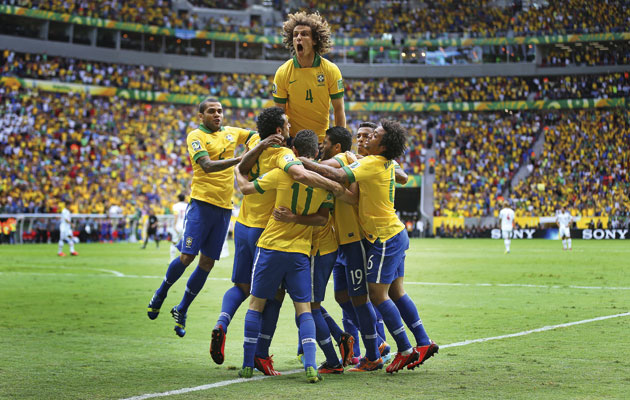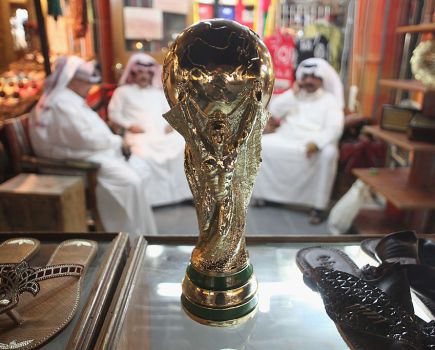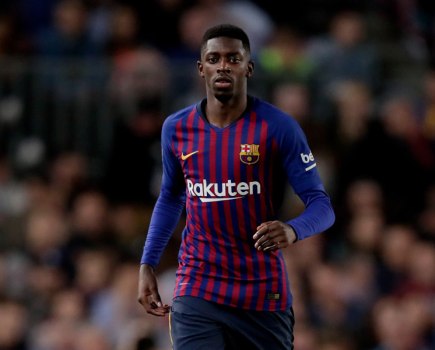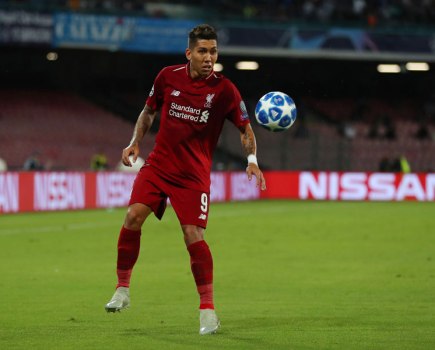Introduction
There is no other objective that we’re interested in,” says coach Luiz Felipe Scolari. “So we need to state it: we’re at home, the conditions are in our favour, we’re going to win.” Back in 2012, Brazil’s players were handed their schedule of activities for the World Cup period – and that involved going all the way to the Final.
A little more than a year ago, this might have come across as empty hubris; after taking an ageing squad to the previous World Cup, Brazil’s results suffered as coach Mano Menezes blooded a new generation. There was no noticeable improvement in the first few months of 2013 after Scolari was brought back, but last June was always going to be crucial. With friendlies against England and France followed by the Confederations Cup, Scolari had an extended period of time to work with his players. And the results could not have been better. Where all had been in doubt at the end of May, by June 30 Brazil had installed themselves as World Cup favourites.
Even more important than the 3-0 triumph over Spain in the Final of the tournament was the fact that they had forged an identity as a team, winning over their own fans up and down the land. The turbulent political situation even seemed to have worked in their favour. Before the matches, when the music for the national anthem stopped, the fans and players kept on singing, providing a powerful symbol of the bond linking the stands to the pitch.
With his starting line-up settled, Scolari has been able to use subsequent friendlies to try out little experiments. Almost everything has worked: the recall of Ramires, the introduction of Willian and Fernandinho, Robinho used as a “false nine” (although he was to be left out of the final squad).
Brazil’s problem now is who to leave out; Maicon or Rafinha at right-back, for example. Dani Alves played a few minutes at left-back in a recent game – is Scolari really thinking of sacrificing a reserve in order to find room for all his attacking options?
Doubts remain about the form of keeper Julio Cesar after his lengthy period of inactivity. But the main worry is the cruel nature of the competition; the harsh lesson of 1950 is that no matter how brilliant the football, a bad 15 minutes can be enough to end the dream.
Brazil reacted well to conceding goals in friendlies, but they won the Confederations Cup without ever going behind. How will they cope should it happen when it really matters?
Coach
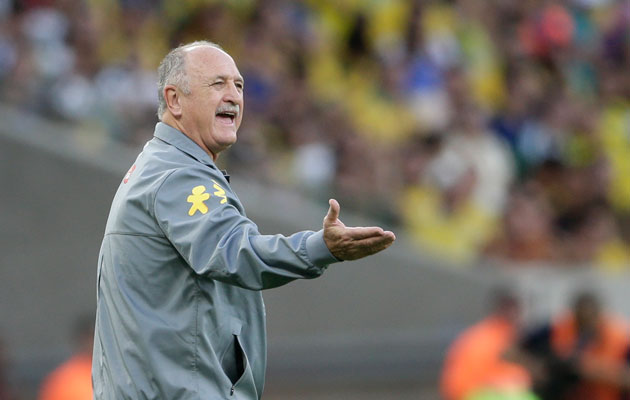
Luiz Felipe SCOLARI
Age 65 (09.11.48). Brazil coach since November 2012
How he got the job
Appointed after Mano Menezes was sacked, he was the popular choice, seen by many as being the only candidate with the necessary strength of character to take charge of a home World Cup.
Past successes as a coach
Won the 2002 World Cup and the 2013 Confederations Cup. Also took Portugal to the Final of Euro 2004 and the semi-finals of the 2006 World Cup.
Past failures as a coach
Has described losing the Euro 2004 Final, at home to Greece, as the biggest disappointment of his career. His spell with Chelsea would have to go down as a failure. Was sacked by Palmeiras prior to being appointed by Brazil.
Achievements as a player
A defender in the lower leagues.
World Cup experience
Won it with Brazil in 2002 and came fourth with Portugal four years later.
Relationship with the media
Usually has them eating out of his hand.
Relationship with the public
His father-figure charisma and steely “man of destiny” glare go down a treat.
Style of management/coaching
A pragmatist, but can also be instinctive and surprising. He had always favoured 4-4-2 with a big target man, so it was a shock when his previous spell in charge of Brazil was characterised by the use of a back three. A skilled and sensitive man-manager.
Notable backroom staff
His faithful assistant is Flavio Murtosa and his co-ordinator is Carlos Alberto Parreira, a World Cup-winning coach in his own right. The physical preparation specialist Paulo Paixao is credited with playing a vital role in the 2002 triumph.
After the World Cup
Unclear. In 2002 he quit just after winning the tournament.
Squad:
Goalkeepers: Julio Cesar (Toronto FC), Jefferson (Botafogo), Victor (Atletico Mineiro)
Defenders: Marcelo (Real Madrid), Daniel Alves (Barcelona), Maicon (AS Roma), Maxwell, Thiago Silva (both Paris St Germain), David Luiz (Chelsea), Dante (Bayern Munich), Henrique (Napoli)
Midfielders: Paulinho (Tottenham Hotspur), Ramires, Willian, Oscar (all Chelsea), Hernanes (Inter Milan), Luiz Gustavo (VfL Wolfsburg), Fernandinho (Manchester City)
Forwards: Bernard (Shakhtar Donetsk), Neymar (Barcelona), Fred (Fluminense), Jo (Atletico Mineiro), Hulk (Zenit St Petersburg).
Group A fixtures
June 12 v Croatia (Sao Paulo)
June 17 v Mexico (Fortaleza)
June 23 v Cameroon (Brasilia)

